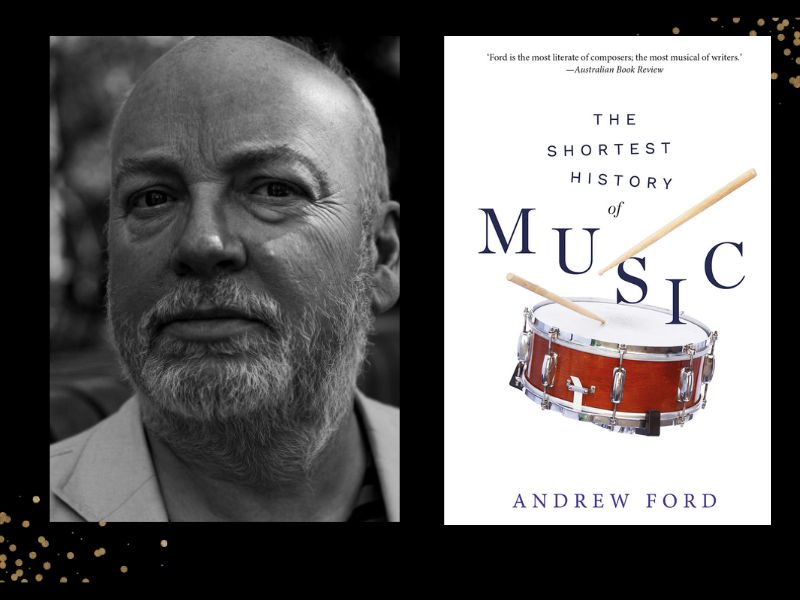Before we start, a few umbrella observations of this book need to be noted – in fact, they may comprise the majority of this review. The first is the three-star rating; this book really should be rated, like some documentary films, “Exempt from Classification”. Giving this book either one star or five stars is kind of meaningless.
The reason for this is because the book is so thick with musical references, knowledge and vocabulary that, in order to keep up with it, the reader needs to know so many musical references, knowledge and vocabulary that they probably don’t need to be reading the book in the first place. There’s so much assumed knowledge that it feels like Ford is a lecturer in a university, and the audience is a room of seasoned academics. For example:
Truly contrapuntal music involves lines that work together harmonically while being both complementary and independent of each other in terms of melodic shape and rhythm.
Your brain needs time to sit and work out what that means, but the narrative bolts ahead, assuming that all is understood.
David Attenborough’s introduction to natural history, Life on Earth, assumed the reader knew little of the topic matter; Stephen Hawking’s introduction to theoretical cosmology, A Brief History of Time, assumed the reader knew next to nothing; Ford’s book assumes the reader has a degree in classical music history with a major in ethnomusicology, an encyclopaedic knowledge of jazz and fluency in music scales. This is why it is hard to give the book a star rating. It just is what it is – that being an academic text written for people who are already in the club.
A third umbrella point is typified by a quote from Franz Brendel: ‘The works of young, living composers are all too often neglected.’ From the probable hundreds of names in Ford’s book, I’d say that less than 5% are still alive. This common trend – of academic writing seeming to shun musical artists until they’re dead – is just what I found when I did my first degree, majoring in music journalism and sociomusicology, reading books like Nicholas Cook’s 1998 Music: A Very Short Introduction (part of an Oxford University Press series of books from which Black Inc’s The Shortest History of… series of books is presumably modelled). What about the artistic contributions of Mike Patton? Nick Cave? Radiohead? Björk? Or the sociopolitical effects of Midnight Oil? Rage Against the Machine? Fela and Femi Kuti?
Despite the points above, which I think are vital to mention, Ford’s book is an extremely well-written introduction to, basically, humans’ relationship with organised noise from the earliest hominids to circa the 1970s. It covers at length the impacts of first, notation, and second, recording, on our relationship with music. Some of this is genuinely fascinating, especially in a society like ours where microphones and music as tradable, portable commodities are commonplace and ubiquitous – Ford shows us the world before them and after them, and it’s a very different place.
Humans’ relationship with music has altered many times through history (and will again); for instance, Ford notes that 80% of the music performed in 1800 was by ‘living composers’, but in the 30 years from 1850 that number had dwindled to 20%. Ford doesn’t mention this, but what about the contemporary popularity of cover bands, or their current euphemism, the “tribute show”. I think there’s a connection.
Presumably Ford was commissioned to deliver a history of the coexistence of humans and music from prehistory to a few decades ago, and this goal he has achieved with aplomb. However, in terms of narrative voice, this isn’t a book, it’s a thesis. It’s a 256-page academic essay in which assumed knowledge and esoteric vocabulary gleefully dance before the perplexed layman’s eyes. This isn’t necessarily a bad thing – it just needs to find the right audience.
Read: Book review: Under a Rock, Chris Stein
Because of Ford’s The Music Show on ABC Radio National, legions of his fans have presumably pre-ordered this book. They are probably this book’s intended audience. And it’s that audience who will very likely give this book the five-star review.
The Shortest History of Music, Andrew Ford
Publisher: Black Inc
ISBN: 9781760644086
Format: Paperback
Pages: 256pp
Publication date: 30 July 2024
Price: $27.99





